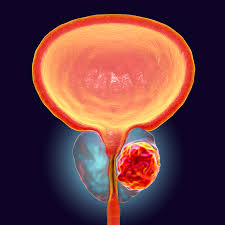Prostate cancer, as the very name suggests, is a type of cancer that affects the prostate which is a gland in men responsible for producing the seminal fluid. This is one of the most common types of cancer in men which grows at a rather slow pace. However, in a few cases, it has been witnessed to grow at a quick pace according to cancer specialist hospitals in Delhi.
If detected early, and if confined to just the prostate gland, this kind of cancer has a better chance of successful treatment when compared to other cancers.

Symptoms
During the early stages, patients may not witness any signs or symptoms. However, it is during the advanced stages, that symptoms start appearing, a few of which are as follows:
- Trouble urinating
- Pain in the bones
- Blood in the semen
- Erectile dysfunction
- Discomfort in the pelvic area
- Decreased force of the urine stream
Causes
The exact causes behind the occurrence of prostate cancer are still not known. However, doctors claim that it begins when some of the prostate cells become abnormal. This happens when mutations take place in the DNA of these cells which causes them to two and divide at a more rapid pace than normal cells. Moreover, these abnormal cells also tend to continue living when normal cells die out. At a later stage, these abnormal cells form a tumour and spread to other body parts.
Diagnosis
Diagnosis of prostate cancer begins with screening. However, whether men who do not exhibit signs of prostate cancer should opt for screening still continues to be a controversial one. This is because many medical organisations do not agree on whether the screening process delivers benefits or not.
Despite this, there are some medical organisations which believe that men should consider getting themselves screened for prostate cancer once are 50 years or younger if they have risk factors for prostate cancer. However, before going for the screening process, patients should discuss with their doctor to decide whether the screening process would be beneficial or not.
Prostate cancer screening process at cancer specialist hospitals in Delhi and surrounding areas consist of two parts which are:
Digital Rectal Exam (DRE) – In this, a doctor inserts a gloved, lubricated finger into the rectum to examine the prostate and check for any abnormalities in the shape, size, and texture of the gland. Depending on the outcome of this, a doctor may suggest further tests
Prostate Specific Antigen (PSA) test – PSA is a substance which is naturally produced by the prostate gland and is found in the bloodstream. To do this test, a blood sample is drawn from a vein in the arm. If the PSA level is above normal, it can indicate cancer, enlargement, or inflammation of the prostate gland.
Depending on the results of the screening tests, further tests are done to establish whether the patient has prostate cancer or not. These include:
Ultrasound – In this, a small probe is inserted into the patient’s rectum and using sound waves a picture of the prostate gland is rendered. This is better known as trans-rectal ultrasound.
Prostate Tissue – Sample cells are collected from the prostate, a process known as prostate biopsy wherein a thin needle is inserted into the prostate to collect tissue. Later, the collected tissue is analysed to check whether it has cancer cells or not.
Depending on the extent to which cancer has spread, doctors suggest one or more of the following tests:
- MRI
- CT scan
- PET scan
- Bone scan
- Ultrasound
Treatment
Prostate cancer treatment depends on a number of factors such as:
- The health of the patient
- The growth rate of the cancer
- The extent to which cancer has spread
- Benefits or side effects of the treatment
Depending on these factors, some men with low-risk of prostate cancer may not require any treatment at all and instead active surveillance is suggested. This includes regular tests, rectal exams and biopsies at regular intervals to check the spread of cancer. If cancer spreads, then treatment options such as surgery or radiation may be opted for.
Prostate Removal Surgery
This surgery, also known as prostatectomy, involves removal of the prostate gland and a few surrounding tissues and lymph nodes. This surgery is done either using a robot which makes the surgery minimally invasive or by making an incision in the abdomen and removing the prostate gland.
Radiation Therapy
In radiation therapy, high-powered energy beams are used to kill cancer cells as part of prostate cancer treatment. This can be done in two ways – either by directing the energy beams from outside or by placing radioactive seeds in the prostate tissue.
For more such informative Guest Posts and Lifestyle posts keep visiting my blog.
This informative post is written and contributed by Vanshikha Sharma. Please read her bio below.
About the Author
I am Vanshikha Sharma, an introvert and a cricket enthusiast. I work in corporate sector, has over 13 years of very bad experience dealing with cancer patients as my grandfather got diagnosed with kidney cancer in my school days and after some years my uncle got diagnosed with neck cancer & then I lost two very close people to it so I love to spread awareness about health related problems with a vision if I can save someone’s loved and dear one with this. You can reach me @ https://medium.com/@vanshikasharma_73688








Taylor Bishop
Thanks for the interesting article about prostate cancer. You mentioned that symptoms could include pain in the bones. I’m interested to learn if the pain would be on any bone or those near your hip.
Shamik
Thanks Taylor for reading the post and adding your comment. Yes you are right “It’s also possible for cancer and other conditions to cause pain in a part of the body other than the actual site of the disease. That kind of pain is called “referred pain.” For example, prostate cancer can cause pain the back, hips, and upper thighs even if the cancer hasn’t spread.” – Healthline (Online)
https://www.healthline.com/health/prostate-cancer/prostate-cancer-and-back-pain#:~:text=It's%20also%20possible%20for%20cancer,the%20cancer%20hasn't%20spread.
Narinder Bhatia
Hi, that’s a very informative post and much needed. There’s a lack of awareness about this (prostrate cancer) and that only makes the things worse for the patient. The post details out everything related to the disease and makes it easier for anyone interested in knowing more about the cause, symptoms, tests and procedures related to the disease
Shamik
Thank you so much Narinder for a detail comment on the post. I’m glad that you felt the post is of an use for you.